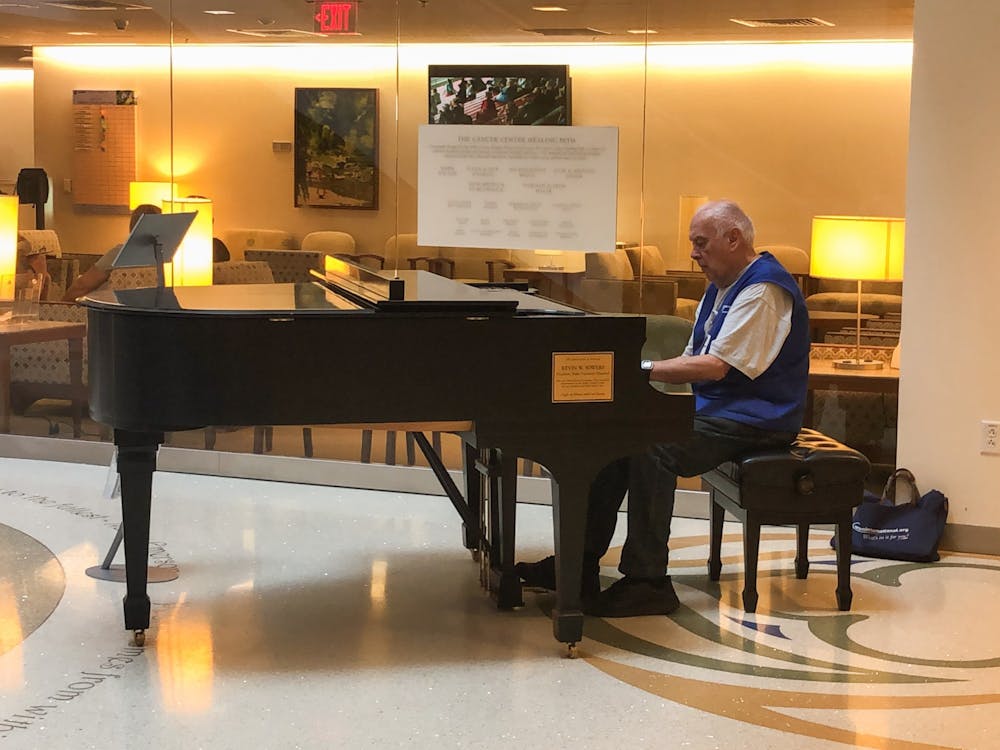Walking through the door of the Duke Cancer Center, visitors are greeted by a reception desk and a graceful crescendo of eighth notes swelling from the Steinway piano one floor below.
Mircea Stefan Stanescu sits at the sleek black piano bench, original compositions and improvisations flowing with incredible dexterity from his 82-year-old fingers. When the piece comes to an end, he waves to the crowd of people peering down on him from the balcony.
Stanescu, who spent his childhood in Romania, began playing when he was 7 at his mother’s strict request. His love for music grew and transformed throughout the years, and he began performing at the Duke Cancer Center more than three years ago after his wife passed away. Although he is scheduled to play only Mondays, Stanescu serenades his listeners multiple times per week, bringing music and hope.
Stanescu said that when he plays, it’s as if he’s in another world.
“I don’t know how to explain it. I feel very happy, and I feel very happy that somebody is listening and likes it,” he said.
Stanescu was born in Brasov, a town in the Transylvania region of Romania. He recalled that he had few resources growing up under communist rule, as many movies were considered propaganda, and it was difficult to access good books. However, his mother kept him busy with playing piano.
“If I didn’t come when she called me first, when she called me a second time, a sensible part of my back was in danger,” Stanescu said.
For three years, he viewed the piano as a nuisance that kept him from playing outside with his friends, who also played music. Together, they joined an orchestra and competed throughout Romania. For Stanescu, music evolved from a chore to a passion, something that he is grateful for to this day.
In 1963, he met a neighbor whom he would one day marry, as she was studying to be an engineer. They had their first daughter shortly after. Although Stanescu loved his hometown, he felt that his liberty and lifestyle were too restricted. After he was asked to pledge his support to the Communist Party, Stanescu said that he and his wife decided it was best to seek new opportunities in the United States.
The Stanescu family landed at John F. Kennedy airport in New York City in 1970. Although he left Romania behind, he brought its music to his new home. Stanescu recounted his disbelief when he stumbled upon an advertisement for a $50 Steinway piano from a wealthy homeowner in Long Island, N.Y.
“I couldn’t believe my eyes,” he said.
Since then, three generations of Stanescu hands have played music from that Steinway’s worn keys.
Stanescu also has a commitment to service, as he has logged over 300 hours of volunteering at the hospital, despite being required to play only two hours a week.
“He’s become a character at Duke Hospital,” said William Dawson, musician in residence and Semans/Byrd performing arts coordinator. “His dedication and his seriousness to what he is doing is remarkable. Also, remember that he’s not getting paid to do this. He’s a volunteer.”
Beyond his music, Stanescu also brings a positive presence each time he visits the hospital. Dawson said that Stanescu is “so polite and so regal” and treats people with immense respect.
Stanescu’s own family has felt the pain of hospital patients and their families firsthand. In 2012, his daughter was diagnosed with MELAS, a rare genetic disorder that can lead to stroke-like episodes. Just one year later, his wife was diagnosed with the same disease, leaving her paralyzed. His wife died from MELAS in 2015, and he lost his daughter in July.
While taking care of his wife, Stanescu began composing his own music.
“I would play classical music which she liked… but then I started my compositions which she liked very much so I got encouraged, and I started to compose,” he said.
Most of Stanescu’s compositions are based on Romanian folk music, a style that he said is more romantic than most people are used to hearing. For years, his compositions only existed in his mind. With the help of Dawson and Dan Ruccia, Master of Arts ‘08 and Ph.D. ‘13, Stanescu was able to transcribe 14 of his original pieces. Now, even other hospital volunteers have begun to play them.
Amid the buzzing and flashing of pagers, the constant movement of wheelchairs and walkers, Stanescu plays on, breaking concentration only to glance at those who have stopped to admire his playing.
“Music in the public spaces helps contribute to the healing environment of the hospital… just to let people know that there is still hope, there is still life, there is still beauty, there is still art,” Dawson said.
This rings true for patients, family members and hospital staff.
Cheri DeCastro was walking through the cancer center when she stopped to look down and listen in on Stanescu playing from the floor below.
“He plays really well. I’m thinking he must have learned when he was young,” she said as his notes filled the center.
Lorna Watt, a janitor at the center, put her work aside for a moment to enjoy the music.
“Now he can play that piano,” she said. “He’s good.”
In front of the grand instrument, an engraving on the hospital floor reads “Hope is a gift that we give to each other daily.”
For Stanescu, the hope and healing that playing the piano provides is twofold. Not only is he able to share hope with those who listen to his music, but he also views playing as a form of therapy.
“[Playing music] makes me happy,” he said. “And if I’m busy, I am not falling in the jar of melancholy because of my losses and the adversity in my life. So I’m busy, I make somebody happy and I make myself very happy.”
Get The Chronicle straight to your inbox
Signup for our weekly newsletter. Cancel at any time.

Maria Morrison is a Trinity senior and a digital strategy director for The Chronicle's 117th volume. She was previously managing editor for Volume 116.

